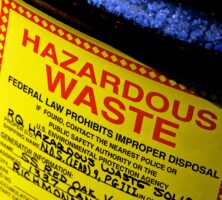The Superfund Amendments and Reauthorization Act (SARA), passed on October 17, 1986, amends the Comprehensive Environmental Response, Compensation, and Liability Act (CERCLA, or Superfund), which the U.S. Congress passed in 1980 to help solve the problems of hazardous-waste sites. SARA provides Georgia residents with the resources needed to clean up hazardous waste sites, as well as emergency plans to follow in case of a dangerous substance release. The Georgia Environmental Compliance Assistance Program (GECAP) assists with the implementation of SARA in the state.

Photograph by Jeremy Brooks
A shortage of funds for Superfund initiated the passage of SARA, as did an incident in Bhopal, India, in which a gas leak at a U.S.-owned pesticide plant in 1984 exposed around 550,000 people to more than forty tons of methyl isocyanate gas. (As of 2009 the contaminated site had not yet been cleaned up, and more than 22,000 victims of the disaster continued to receive long-term care at the Sambhavna Trust Clinic, which treats survivors at no cost.) SARA legislation, passed two years after the Bhopal incident, includes a tax on chemical and petroleum industries and provides the federal government with the power to respond directly to releases or threatened releases of hazardous substances that could harm public health or the environment.
SARA increased the Superfund trust fund by $8.5 billion and reinforced the importance of human health, community involvement, cooperation with state and local laws and authorities, and permanent solutions to hazardous-waste cleanup. Under SARA the U.S. Environmental Protection Agency (EPA) is required to assess the degree of risk to human and environmental health at sites on the Superfund’s National Priority List (NPL). The NPL includes toxic-waste sites around the country that are subject to Superfund legislation; in 2009 fifteen of these sites were located in Georgia.
SARA Title III
The Emergency Planning and Community Right-to-Know Act (EPCRA) of 1986, also known as SARA Title III, establishes emergency planning and reporting requirements for industry and government, and gives communities the necessary tools for planning and responding to the potential release of hazardous waste. Title III enhances emergency-planning guidelines and provides funding for training in emergency planning, response, and recovery, particularly for individuals working in public safety, law enforcement, and medicine. Each state governor is required to designate a State Emergency Response Commission (SERC), which in turn must designate Local Emergency Planning Committees (LEPCs) within each state district. Both the SERCs and the LEPCs are required to create emergency-response plans for use in the release of a hazardous substance.
SARA Title III also serves to inform the public of hazardous substances within the community and imposes public reporting requirements for people and companies involved in processing, producing, or storing hazardous waste. These individuals and organizations must maintain records and an inventory of hazardous chemicals and annually submit these documents to the SERC, LEPC, or local fire department. In addition, owners and operators processing or using hazardous chemicals in excess of EPA threshold quantities must submit annual toxic chemical release forms to the EPA.
Enforcement
SARA is enforced by the Office of Solid Waste and Emergency Response (OSWER) within the EPA. OSWER manages many hazardous Superfund sites by region, with both long-term and short-term cleanup plans. One example of long-term regulation is the Superfund Remedial Response Program. Under this program, site evaluations of maintenance after a cleanup are conducted until the site’s removal from the NPL. Many Superfund sites within Georgia have been managed in this way, including the cleanup of arsenic-contaminated groundwater at the Monsanto Corporation site in Augusta; of radioactive contamination at Luminous Processes Inc. in Athens; and of metal-contaminated groundwater at the Cedartown Municipal Landfill in Polk County.
The Emergency Response and Removal Program was organized for the short-term regulation of hazardous substances and oil spills under SARA. The program was developed to immediately remove dangerous substances from a public site and to prevent the potential expansion of hazardous substances and oil to the surrounding environment. Region 4 (which includes Georgia) has been active in this program, and examples in Georgia include a motor-oil tank explosion at Sike’s Oil Services in Jefferson ( Jackson County), and a sheen (a thin layer of oil on top of water) appearing in waters around the Hartsfield-Jackson Atlanta International Airport after a jet fuel overflow.
GECAP
In 1987 the state provided funds to the Georgia Tech Research Institute, at the Georgia Institute of Technology in Atlanta, for the Waste Reduction and Environmental Compliance Program, which became GECAP in 2001. The program was implemented to assist Georgia businesses and industries in dealing with environmental issues under SARA. The program provides technical assistance to help with such environmental concerns as oil storage and spill prevention, industrial wastewater, solid waste management, and hazardous waste. The program offers free and confidential assistance to small and mid-sized companies in Georgia and provides SARA regulations to state businesses in an accessible and understandable form.
GECAP also provides onsite assessments of the environmental compliance status of industrial facilities. For example, GECAP offers a compliance storm-water tool that allows Georgia businesses to determine if additional sampling requirements are necessary in their areas. These tools allow for businesses to better understand and comply with environmental regulations.






